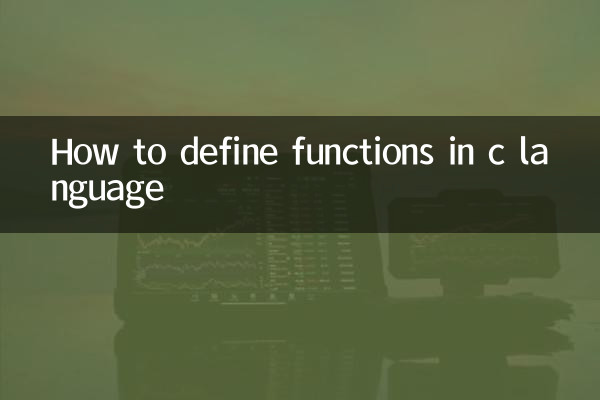How to define functions in C language
In C language, functions are one of the basic building blocks of programs, used to encapsulate reusable code logic. Defining functions needs to follow specific grammatical rules. This article will introduce how to define functions in detail, and present relevant examples in the form of structured data based on hot topics and hot content on the entire network in the past 10 days.
1. Basic syntax of C language function definition

In C language, a function definition usually includes the following parts:
| components | illustrate | Example |
|---|---|---|
| Return type | The data type returned by the function (such as int, float, void, etc.) | int |
| function name | The identifier of the function must comply with the naming rules | add |
| Parameter list | Variables passed to the function (optional) | (int a, int b) |
| function body | The specific implementation code of the function | { return a + b; } |
Complete example:
| function definition | Call example |
|---|---|
| int add(int a, int b) { return a + b; } | int result = add(3, 5); // result = 8 |
2. The combination of hot topics on the Internet in the past 10 days and C language functions
The following is an example of the combination of hot topics on the Internet and C language function definitions in the past 10 days:
| hot topics | C language function example |
|---|---|
| Artificial Intelligence (AI) | void predictAI(float input) { /* AI prediction logic */ } |
| Blockchain technology | void generateHash(char* data) { /* Hash generation logic */ } |
| metaverse | void render3DModel(int modelID) { /* 3D rendering logic */ } |
| New energy vehicles | float calculateBatteryLife(float voltage) { /* Battery life calculation */ } |
3. Things to note when defining functions in C language
1.The difference between function declaration and definition: A function declaration contains only the return type, function name, and parameter list, while the definition contains the function body.
2.Scope rules: Variables defined within a function are only valid within that function.
3.recursive function: The function can call itself, but please pay attention to the termination condition.
| Error example | Correct example |
|---|---|
| int add(a, b) { return a + b; } // Missing type declaration | int add(int a, int b) { return a + b; } |
4. Advanced function definition skills
1.function pointer: Functions can be passed as parameters.
Example:
| definition | call |
|---|---|
| void execute(void (*func)(int)) { func(10); } | execute(&printNumber); |
2.variadic function: Supports an indefinite number of parameters.
Example:
| definition | call |
|---|---|
| int sum(int count, ...) { /* variable parameter logic */ } | int total = sum(3, 1, 2, 3); |
5. Summary
The definition of functions in C language is the basis of programming. Reasonable function encapsulation can improve the readability and reusability of the code. This article provides structured examples from basic syntax to advanced techniques, combined with popular topics, to help readers better master the method of function definition.

check the details

check the details